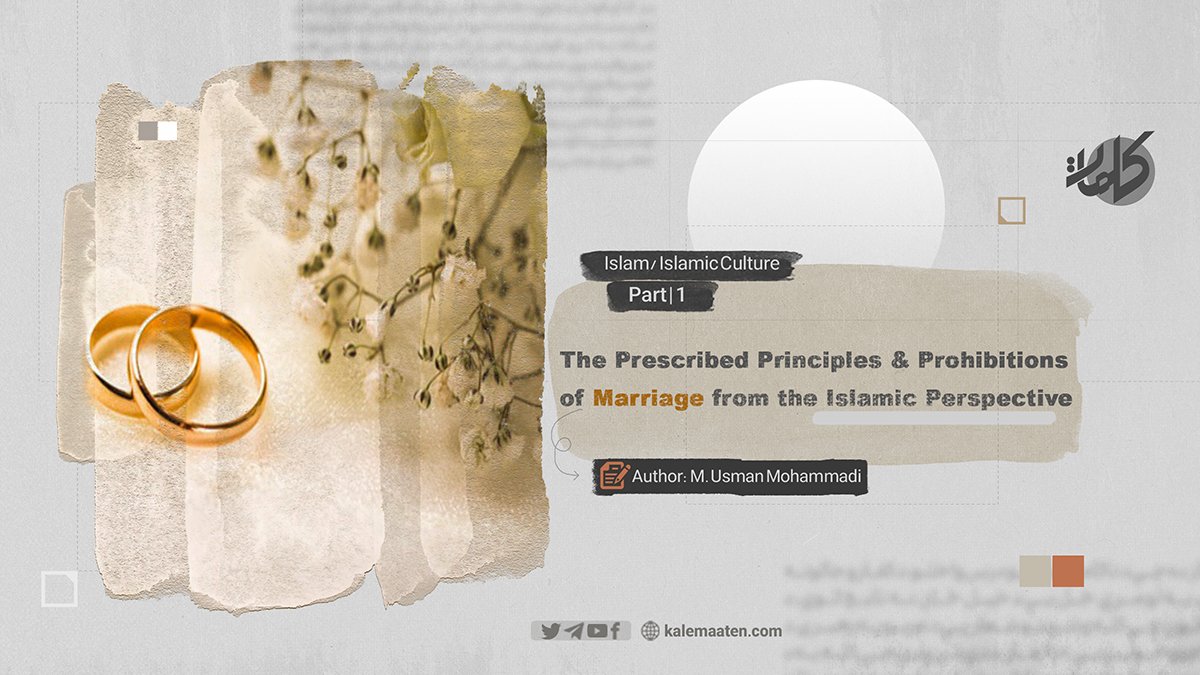
Author: M. Usman Mohammadi
The Prescribed Principles and Prohibitions of Marriage from the Islamic Perspective (Part One)
Although in our society, from the young to the old, everyone is familiar with the concept of Khastegari (marriage proposal) and has witnessed it repeatedly, some people are still unaware of the principles and rules that the sacred religion of Islam has established for its proper implementation. Consequently, these principles are often neglected during the process of proposing marriage.
Usually, we assume that Khastegari is a simple request for marriage made by the boy’s family to the girl’s family, followed by either a positive or negative response. However, Khastegari is not that simple—it carries numerous responsibilities. It is a process that lays the foundation of marriage and plays a vital role in the happiness of both man and woman. Therefore, this important step includes certain dos and don’ts that, if observed, can lead to a prosperous and joyful life for both parties. On the other hand, neglecting these guidelines can significantly contribute to the destruction of their lives.
The sacred religion of Islam, with its eternal system and firm yet simple principles, has set forth a number of rules and practical guidelines for the one proposing marriage to observe regarding the girl of interest. If young people take these principles into account and choose their future spouse accordingly, both they and their partners will attain happiness, love, and mutual affection. They will live under the shadow of a blessed marriage with complete harmony and mutual understanding.
This article aims to introduce the concept of Khastegari, explain some of its religious rulings, clarify the dos and don’ts of the process, and pave the way for laying the foundation of marriage in accordance with Islamic principles.
The Concept of Khastegari (Marriage Proposal):
Khastegari is the process in which, prior to the formal engagement ceremony (Nikah), a man who intends to marry investigates or examines the girl he is considering for marriage. He may do this himself or send a relative or close acquaintance to talk with her, to ask about her expectations and conditions for marriage, and then make a decision on whether to accept or decline the union.
The purpose of these pre-marriage steps is to ensure that the marriage is based on understanding and insight from the very beginning, which can help resolve potential problems and conflicts that may arise in their future marital life. Moreover, this process helps strengthen the relationship between the two families and their future offspring.
Khastegari is considered one of the preliminary steps in marriage and usually follows specific traditions and customs. Sometimes, this request is made directly to the woman or girl, and at other times, it is directed to her family members—such as her father, mother, brother, or other close relatives—based on the prevailing cultural norms of the society.
According to this definition, Khastegari is seen as an initial mutual agreement between the two parties to the marriage contract. Its purpose is to express a willingness to marry or indicate mutual consent between the man and the woman. In some cases, this preliminary agreement is announced through a small or large Shirini Khori (sweets-sharing ceremony), held in the presence of both families, accompanied by the exchange of some gifts and offerings.
Like other initial stages of marriage, Khastegari serves as a means for both parties to become familiar with each other’s character, temperament, and way of thinking (within the limits permitted by Islam). When they meet and exchange questions, the process of establishing a lifelong relationship begins. Both parties gain confidence that their future life will be built upon love, tranquility, and peace, in an environment filled with happiness and harmony—something that all young men and women, along with their families, desire.
To achieve this goal, the sacred religion of Islam has made Khastegari lawful, in order to remove doubts and ambiguities that might arise in this regard.
On the other hand, through the Khastegari process, the guardians of both parties can choose someone who is capable of handling the responsibilities of life, is religious, and has good moral character. In such a case, the life of the couple will be guided by the light of the divine religion of Islam. It is clear that any marriage established after such preparatory steps will produce positive outcomes.
Continues…


